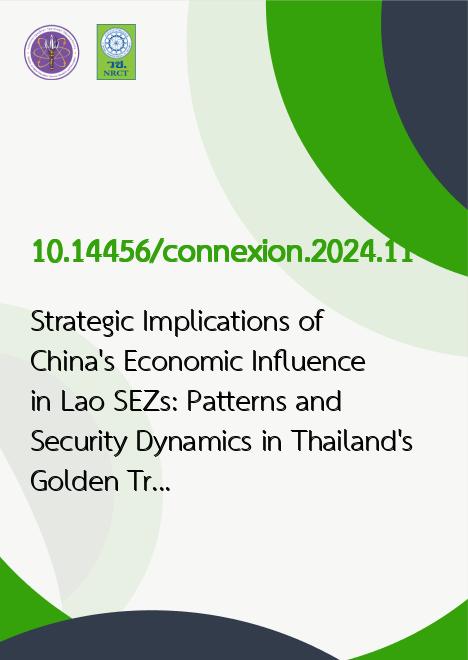
|
Strategic Implications of China’s Economic Influence in Lao SEZs: Patterns and Security Dynamics in Thailand’s Golden Triangle |
|---|---|
| รหัสดีโอไอ | |
| Creator | Yuthpong Chantrawarin |
| Title | Strategic Implications of China’s Economic Influence in Lao SEZs: Patterns and Security Dynamics in Thailand’s Golden Triangle |
| Publisher | Mae Fah Luang University |
| Publication Year | 2567 |
| Journal Title | Connexion: Journal of Humanities and Social Sciences |
| Journal Vol. | 13 |
| Journal No. | 2 |
| Page no. | 49-71 |
| Keyword | China, Special Economic Zones (SEZs), Golden Triangle, Thailand, Security Dynamics |
| URL Website | https://so05.tci-thaijo.org/index.php/MFUconnexion |
| Website title | Connexion: Journal of Humanities and Social Sciences |
| ISSN | 2821-9651 |
| Abstract | This study examines the economic influence of China in Laos’s Special Economic Zones (SEZs) and the resulting security implications for Thailand’s Golden Triangle region. Using a qualitative approach—including field observations, interviews, and document analysis—conducted from March 1, 2023, to February 29, 2024, and analyzed through thematic data analysis, the research identifies specific patterns of Chinese investment that drive economic growth but also challenge regional stability. China’s SEZs in Laos, particularly in areas near the Golden Triangle, focus heavily on infrastructure, tourism, and commercial sectors. These investments, while promoting trade and development, create economic dependencies that may compromise Laos’s sovereignty and shift local economies towards a dual structure where legitimate enterprises coexist with informal and illicit networks.The findings reveal that improved cross-border connectivity facilitates both legal trade and transnational crime, including drug trafficking and human smuggling, which exacerbate security challenges for Thailand. Additionally, socio-cultural shifts from the influx of Chinese workers and tourists influence local demographics, increasing living costs and causing tensions in Thai border communities. The study concludes that Thailand must strategically navigate these developments by strengthening border security, engaging in diplomatic collaboration with China and Laos, and fostering regional partnerships within ASEAN. This nuanced approach will be essential to balancing economic benefits with sovereignty concerns and mitigating security risks. Ultimately, the research highlights the importance of policies that support sustainable regional integration and maintain stability in the face of China’s expanding economic presence in Southeast Asia. |
